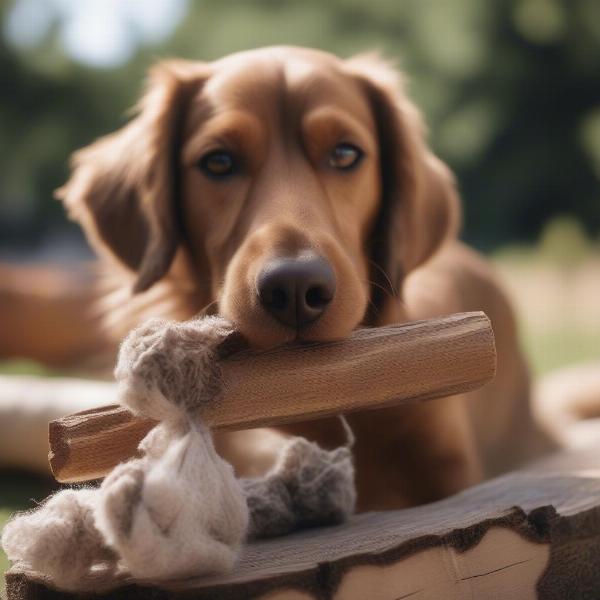The term “knotty knotty dog” likely refers to a type of chew toy, specifically those made from natural materials like wood, roots, or other plant-based fibers that have knots and bumps. These chews, often marketed as “knotty” or “gnarled,” offer a durable and engaging chewing experience for dogs, satisfying their natural instinct to gnaw. Understanding the benefits, risks, and how to choose the right knotty chew for your dog is essential for responsible pet ownership.
 Dog chewing on a knotty root chew toy
Dog chewing on a knotty root chew toy
Why Dogs Love Knotty Chews
Dogs have a strong innate need to chew, especially during puppyhood when they are teething. Even adult dogs benefit from chewing, as it helps to keep their teeth clean, strengthens their jaws, and provides mental stimulation. A knotty chew toy offers a textured and challenging surface that can keep a dog entertained for hours. The irregular shapes and knots provide different points of contact, making the chewing experience more engaging than a smooth, uniform toy. These chews also often have a natural scent and flavor that dogs find appealing. knotty dog
Benefits of Knotty Chews
- Dental Health: Chewing helps to scrape away plaque and tartar buildup, promoting healthier gums and teeth.
- Mental Stimulation: The challenging texture and irregular shape of a knotty chew can keep dogs occupied and prevent boredom, reducing the likelihood of destructive behaviors.
- Jaw Strength: The act of chewing strengthens the jaw muscles and can be particularly beneficial for growing puppies.
- Stress Relief: Chewing can be a soothing activity for dogs, helping to alleviate anxiety and stress.
Choosing the Right Knotty Chew
Not all knotty chews are created equal. It’s crucial to choose a chew that is appropriate for your dog’s size, breed, and chewing habits. Consider the following factors:
- Size: Select a chew that is large enough to prevent your dog from swallowing it whole, but not so large that they struggle to hold and chew it.
- Material: Look for chews made from durable, natural materials that are safe for dogs. Avoid chews made from treated wood or materials that could splinter easily. Briar root is a popular choice due to its durability and natural resistance to splintering. dog knotty
- Durability: Choose a chew that can withstand your dog’s chewing strength. A chew that breaks apart too easily can pose a choking hazard.
- Supervision: Always supervise your dog when they are chewing on any toy, including knotty chews.
Types of Knotty Chews
- Briar Root: Known for its hardness and unique knotty shape, briar root is a long-lasting and popular choice. briar root for dogs
- Olive Wood: A harder wood option that is also relatively durable and resistant to splintering.
- Coffee Wood: A lighter and softer wood option, suitable for less aggressive chewers.
Potential Risks and Precautions
While knotty chews offer many benefits, it’s important to be aware of the potential risks:
- Splintering: Some types of wood can splinter, which could injure your dog’s mouth or digestive tract. Choose chews made from durable materials that are less likely to splinter, such as briar root.
- Ingestion: If your dog swallows large pieces of the chew, it could cause a blockage in their digestive system. Supervise your dog and remove the chew if it becomes too small or worn down. best dog shampoo for labrador retrievers
- Tooth Wear: While chewing can strengthen teeth, excessively hard chews can also cause wear and tear. Monitor your dog’s teeth for signs of excessive wear.
Conclusion
Knotty chews can be a great way to satisfy your dog’s natural chewing instinct, promote dental health, and provide mental stimulation. By choosing the right chew and supervising your dog during chewing sessions, you can ensure a safe and enjoyable experience for your furry friend. briar roots for dogs
FAQ
- Are knotty chews safe for puppies? Yes, but choose a size appropriate for the puppy’s age and chewing strength.
- What should I do if my dog swallows a piece of the knotty chew? Contact your veterinarian immediately.
- How often should I replace my dog’s knotty chew? Replace the chew when it becomes too small or worn down to prevent ingestion.
- Can knotty chews help with teething pain? Yes, the act of chewing can help to soothe sore gums in teething puppies.
- Are all knotty chews made from the same material? No, they can be made from various types of wood and roots, each with different levels of hardness and durability.
- What if my dog isn’t interested in knotty chews? Try different types of chews or consider introducing them with a small amount of dog-safe peanut butter.
- Where can I buy knotty chews for my dog? Pet stores and online retailers carry a wide variety of knotty chews.
ILM Dog is your go-to resource for all things dog-related. We offer expert advice on dog breeds, health, training, nutrition, grooming, and much more. Whether you’re a new dog owner or a seasoned pro, we have the information you need to keep your canine companion happy and healthy. For tailored guidance and support, contact our experts at [email protected] or call us at +44 20-3965-8624. Visit ILM Dog today!